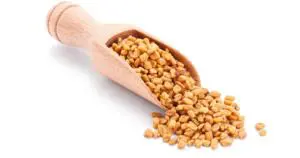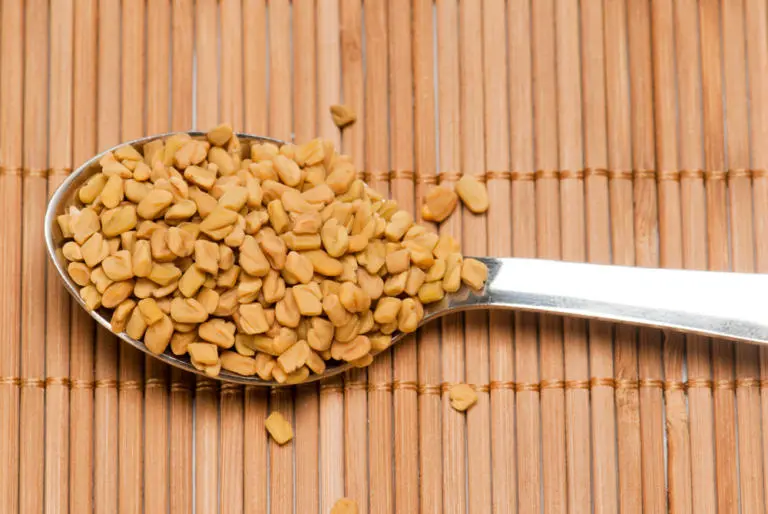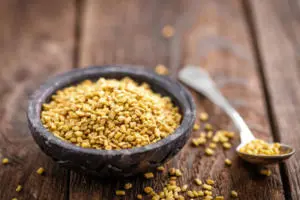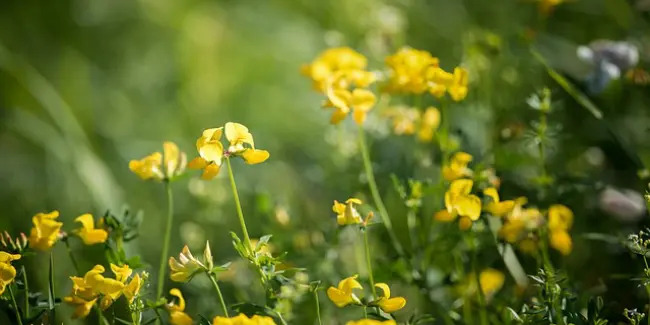
Due to health reasons, Mr. Duchaine is unable to offer this product online for the time being.
Please visit us again later.
The secret benefits of fenugreek for breasts
Using fenugreek to naturally grow your breasts is very possible for all women, by participating in the New Growth program. Quickly growing large breasts is a piece of cake when you know about the beneficial effects of fenugreek on the breasts.
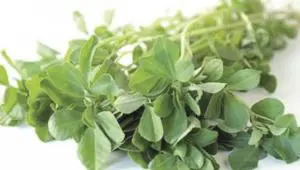
With this program, there is also no risk of getting the dosages wrong which would cause you to develop pimples on your chest, and you are supported all throughout the program, and results are guaranteed.
Why does fenugreek cause breast enlargement?
Thanks to the New Growth program, many women who have sought to increase their breasts naturally are now feeling happy and radiant, with fuller breasts and well-defined curves thanks to Fenugreek breast enhancing pills and oil playing an important role in this success. Unfortunately, fenugreek alone rarely succeeds in perfectly developing the breasts. As a result, fenugreek must be combined with other plants and methods that enhance its effect on the body making the New Growth program the best way to quickly find yourself with larger breasts.
Where does fenugreek come from in grain or powder form?
Fenugreek, or its Latin name Trigonella foenum-graecum, is part of the Fabaceae plant family. It is cultivated worldwide as a semi-arid crop. The leaves and seeds are used in all kinds of ways, from the aromas in curry, to increasing chest and breast size. Fenugreek has been used all over the world. The first discoveries of fenugreek date back to 4000 B.C., with seeds found in archaeological excavations in Iraq.
Centuries ago, fenugreek was linked to Middle Eastern harems, when they still existed, for being used to help promote breast augmentation in women, in order to gain a larger chest. It has also been similarly associated with breast augmentation in other countries around the world.
The seed is the most beneficial part of the plant. This is because extracts obtained from the seeds contain very high levels of phytoestrogens. These phytoestrogens occur naturally in nature and can be found in many medicinal plants. Fenugreek seed extracts contain very high concentrations of this, and are in fact one of the main known natural sources.
hese phytoestrogens are what, in essence, help the body produce more breast tissue. Heightened levels of phytoestrogens resemble the state of your body when started puberty, and this serves as a trigger for the body to start growing the mammary glands. This new tissue growth adds volume to the cleavage, and tonify the enlarged breasts. Breast tissue growth is permanent and will not fade or revert when combined with progesterone and the other plants in the program.
Given that fenugreek is a natural product in both pills and oil form, it stimulates breast tissue growth, especially with regards to glands. The results are not achieved overnight, but are greatly accelerated by the Chinese medicine and homeopathic complex that are included in the new growth program.
We know that every woman's body is different, and so the good thing about the program is that it allows us to ensure results for everyone by also incorporating into the program other natural approaches that vary the way in which the breasts grow. As such, by grouping several natural approaches together, the program makes it possible to find a solution for everyone, regardless of their body type.
Breast gains with the program vary from 1 to 3 cups. The only limit is the genetic disposition of your family. At the end of the program, you’ll have scar-free, larger, firmer and healthier breasts that nature initially planned for you to have.
Fenugreek is a spice that is readily available on the market, but it is often necessary to take a certain amount over a period of several months. Just like with all other spices, it is easy to quickly get tired of the smell and taste, that is why in the program, concentrated oil and powders are used, which means you don’t have to take giant pills and constantly have to deal with the taste of Fenugreek for months. Through taking it, you can therefore have larger breasts by naturally growing them, or in other words, certain (but not all) women can regain their breasts. Women's reactions to phytoestrogens is an important factor, as is their willingness to accept the smell of the spice for months. Unfortunately, after a few days, fenugreek taken by itself colors and gives a smell to urine and sweat. The breast augmentation program avoids all these downsides, and ensures that all women who want to can succeed without complicating their lives, with only half an hour of care per day for 4 months. That's what we call the modern world, ladies!
Can fenugreek make my breasts grow bigger?
This is frequently asked question by women interested in making their breasts naturally grow whilst maintaining their natural breasts. Whether reliable natural breast augmentation actually exists is certainly a common question among all women. Who wants smaller breasts anyway? We all want bigger and prettier breasts. We all want to make our breasts bigger and catch people’s eyes! So the question is who would want to spend a fortune and run the risk of surgery, when there are alternatives like fenugreek available? The dilemma is knowing how to make your breasts grow without having breast implants or surgery, as we already know the risks and costs involved with this. The New Growth program offers a solution, by taking advantage of the capabilities of fenugreek, without experiencing its disadvantages. This is why more and more women are interested in it.
Other uses of fenugreek
For thousands of years, fenugreek has been recognized in herbal medicine as a plant capable of augmenting breasts. For many centuries, the seeds of this plant were used for by the Egyptians, Greeks, Romans and the Chinese. Despite its age, there are still current uses for fenugreek that are supported by modern science, and are the result of serious research:
a. Diabetes
There are some studies in India in which participants in the type 2 diabetes research program who consumed a certain amount of fenugreek seed powder on a daily basis were able to lower their blood glucose levels. This is a well-known phenomenon in Ayurvedic (traditional Indian) medicine. Fenugreek also decreases insulin resistance:
A study carried out in 2012 on rats reached more or less the same conclusions, and stated that glucose levels were almost brought back to normal. Fenugreek is also said to have antioxidant properties that help protect the liver and pancreas.
b. Cholesterol
In various studies over several months, it was shown that participants with high cholesterol levels were able to reduce this through daily consumption of powdered fenugreek seeds. They lowered their problematic cholesterol and triglyceride levels.
c. Arthritis
Some studies have shown that fenugreek contains anti-inflammatory properties that therefore support the traditional use of fenugreek in treating arthritis and other inflammatory diseases (both in internal and external use).
d. Breastfeeding
As mentioned above, fenugreek has been proven to help mothers who breastfeed increase their milk production. It is also one of the effects of the active ingredients in fenugreek that makes it useful for breast growth.
e. Anorexia
Fenugreek is also known to stimulate the appetite and fight anorexia. It also stabilizes sugar levels and helps the pancreas.
f. External treatments (cataplasm)
Traditionally used in Germany as a cataplasm, fenugreek treats wounds, burns, gout, leg ulcers, boils, muscle pain, acne and eczema.
g. Contraindication
Fenugreek stimulates the uterus, so it should not be given to pregnant women. It should be given to diabetics with caution, because it impacts blood sugar levels. Its smell in sweat and urine is also a negative point to be taken into account for many people. The program sidesteps this negative effect by combining it with other plants.
h. Breast enlargement
A 1992 study showed the effectiveness of diosgenin (one of its active agents) on the breast growth of mice over a period of 15 days.
Aradhana, et al. Indian J Exp Biol. 1992.
Fenugreek for Women's Health
Diosgenin is a compound found in fenugreek seeds, and is similar to the hormone estrogen and what it does. An estrogen-dominant state in women can lead to all kinds of gynecological problems, such as weight gain and water retention. When fenugreek seeds are consumed by women suffering with this condition, diosgenin helps to regulate and prevent estrogen dominant states. The other plants included in the program also help prevent any negative side effects. The use of bio-identical progesterone is also advised for all women, to prevent hormonal imbalance. The two hormones work to balance each other out.
Fenugreek is soluble in water and is easily eliminated by the body.
Every woman, especially those going through menopause, should ideally use fenugreek on a regular basis to promote gynecological (hormonal) health and prevent fibroids, cysts or ovarian problems.
In the Middle East, many women also consume fenugreek seeds to increase milk production in mothers that breastfeed. Other uses of fenugreek also include the relief of sore throats and coughs, and healing wounds, boils, and rashes on the chest or elsewhere.
Naturally increase breast size using fenugreek
When a young girl reaches puberty and begins to develop breasts, estrogen comes into action and serves as the main hormone responsible for breast growth. By the time the girl reaches the age of 18-19, or sometimes earlier, estrogen stops working. At this point, if you have finished growing and you still have small breasts, you are told that there is nothing you can after this period to prompt them to continue growing. The New Growth Program, by including fenugreek, can intervene and allow your body to continue growing your breasts, bringing them to their naturally intended size.
One of the ways to naturally grow your breasts from home is to use certain herbs and plants that contain a property called phytoestrogen, which is similar to the estrogen produced by the body. By adding these phytoestrogens to your body, you can help trigger breast growth. Fenugreek is one of the plants that contains this phyto (plant) estrogen: diosgenin that was mentioned above. This compound mimics the effect of estrogen in the body, and can help increase the size of your breasts, either when used alone or in combination with other plants that also contain phytoestrogens.
Fenugreek’s ability to increase breast size was first noticed in Arab women, who not only consume roasted fenugreek seeds to increase milk production, but also to increase the size of their breasts. In addition to using the seeds, it has been observed that diosgenin is contained in greater amounts in fenugreek sprouts compared to the amounts in ungerminated seeds. So, if you are trying to make your breasts grow naturally, you may consider using the sprouts, although using the seeds is still always beneficial.
You can also use fenugreek oil when massaging the breasts, to allow the breast glands a better and faster absorption. These two ingredients are part of the New Growth program and, combined with other plants, ensure the success of your natural breast augmentation.
Advice on how to make a fenugreek cataplasm for your chest
Larger and firmer breasts, without surgery, would be amazing for everybody. Do you want to know how use a cataplasm get a larger chest?
Herbalists believe that fenugreek can help increase breast size as well as also making them firm. Being a phyto-estrogenic plant, fenugreek stimulates breast growth. In addition, it can help increase milk production in breastfeeding mothers.
If you do not have concentrated fenugreek oil like the one in the program, you can use fenugreek powder to make a cataplasm to use on your breasts:
Mix a quarter cup (60 grams) of fenugreek powder with a little water to make a paste. Apply the paste onto the breasts, and massage gently. Leave it on for 10 minutes, and then rinse with water. For best results, follow this remedy twice daily. Another method is to massage your breasts daily with fenugreek oil, or a mixture of one part fenugreek oil and two parts body lotion.
The fenugreek extract will be absorbed by your body, while the circular movement of the massage will help increase the blood circulation in the breasts. Increasing blood flow is a very important factor when it comes to increasing breast volume. Keep in mind that you will need to perform this massage technique twice a day, for about 4 months, as recommended in the program.
Fenugreek oil
Another use of fenugreek which allows it to grow your breasts comes from using it in the form of vegetable oil. In essence, the pressure of the seed allows oil to be extracted from it, and this concentrates all the benefits of fenugreek. Applying this daily via massages, you will also obtain results. You can find more information on this subject in this blog: https://www.manelya.com/huile-de-fenugrec-sante-beaute/
Fenugreek products available on Amazon.ca
1.Organic fenugreek seeds (7 oz) [USDA Certified]
2.Nature’s Bounty Fenugreek 610MG 100 capsules
4,Fenugreek essential oil – 5ml – 100% Pure
Informations complémentaires: fenugrec, poitrine
sources : Passeport santé, Doctisimo
Common names: fenugreek, sénégrain, trigonella
Botanical name: Trigonella foenum-graecum, leguminous family.
English name: fenugreek.
Chinese name: Hu Lu Ba.
Indian name: mehti.
Part used: seeds.
Habitat and origin: native to North Africa and the Mediterranean basin, this annual plant has long been cultivated in Asia, particularly in India and China.
Active ingredients
Fenugreek seeds contain a high number of mucilaginous fibers (up to 40%), as well as a significantly lower amount of steroid saponins (at most 3%), whose qualities are linked to their surfactant role and associated with the regulation of cholesterol.
Use and dosage of fenugreek
Dosage
When taken in pill form, fenugreek should be taken in appropriate doses. The daily absorption should not exceed 4g per day, i.e. approximately 6 to 8 pills of 500mg. It is imperative to follow the dosage indicated on the labels of the boxes and bottles.
- It is also possible to prepare infusions and decoctions of fenugreek at home, by leaving to 1 teaspoon of seeds to infuse in 50cl of hot water. Daily consumption should not exceed 3 to 5 cups.
- To make a cataplasm, use 50g of fenugreek seeds and 1L of water. The mucilaginous nature of the fibers contained in the seeds will form a paste that can be applied to the areas requiring treatment.
Precautions surrounding use of fenugreek
Provided the recommended dosage is followed, there are no particular speical precautions to be taken. However, if in doubt, it is best to discuss the matter with your doctor or pharmacist.
Contraindications
The use of fenugreek is not recommended while pregnant. It is not recommended for diabetics, unless approved by a health care professional. In addition, people with peanut allergies may not be able to tolerate fenugreek absorption.
Adverse effects
Fenugreek can cause allergic reactions. Its peculiar smell can also be present in sweat and urine following a few days of treatment. Finally, you should consult your doctor if you are using fenugreek combined other drug treatments.
When used alongside other medicinal plants or supplements
No known issues.
When used alongside other drugs
Vigilance is required when using anticoagulant treatments, or treatments for asthma and diabetes.
Doctor's opinion
Recognized benefits
Fenugreek is recognized to have medicinal properties. This herbaceous plant is a natural hypoglycemic, which helps to restore appetite in those who have lost it or who suffer from malnutrition. Fenugreek also works for metabolism, and is useful in restoring the correct functioning of the digestive system, particularly in the neuromuscular field.
Warning
Although this is herbal medicine, it is still imperative to follow the recommended dosage. Even if there are very few issues with fenugreek in standardized pills, precautions are however necessary when preparing the medicine from home. It is advised to consult a health professional, doctor or pharmacist for advice. Only he or she will be able to help you achieve the desired goal.
Research on fenugreek
Recent studies on fenugreek have confirmed its role in combatting malnutrition. In addition, scientists have focused on this plant as part of research on diabetes, and found that it reduces insulin resistance. The European Pharmacopoeia includes fenugreek in its list of monographs.
Bibliographie
Barnes Joan, Anderson A. Linda, Phillipson David J. Herbal Medicines, Pharmaceutical Press, Grande-Bretagne, 2007, 3e édition.
Blumenthal M, Goldberg A, Brinckmann J (Ed). Expanded Commission E Monographs, American Botanical Council, publié en collaboration avec Integrative Medicine Communications, États-Unis, 2000.
National Library of Medicine (Ed). PubMed, NCBI. [Consulté le 5 mai 2011]. www.ncbi.nlm.nih.gov
Natural Standard (Ed). Herbs & Supplements - Fenugreek, Nature Medicine Quality Standard. [Consulté le 5 mai 2011]. www.naturalstandard.com
The Natural Pharmacist (Ed). Natural Products Encyclopedia, Herbs & Supplements - Fenugreek, ConsumerLab.com. [Consulté le 5 mai 2011]. www.consumerlab.com
